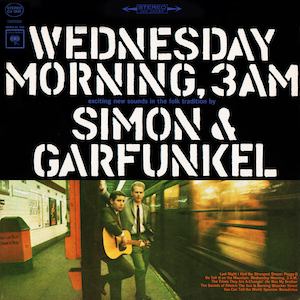
Wednesday Morning, 3 A.M. is the debut studio album by American folk rock duo Simon & Garfunkel. Following their early gig as "Tom and Jerry", Columbia Records signed the two in late 1963. It was produced by Tom Wilson and engineered by Roy Halee. The cover and the label include the subtitle exciting new sounds in the folk tradition. Recorded in March 1964, the album was released on October 19.

The B-52s, originally presented as the B-52's, are an American new wave band formed in Athens, Georgia, in 1976. The original lineup consisted of Fred Schneider, Kate Pierson, Cindy Wilson, Ricky Wilson (guitar), and Keith Strickland. Ricky Wilson died of AIDS-related illness in 1985, and Strickland switched from drums to lead guitar. The band has also added various members for albums and live performances.
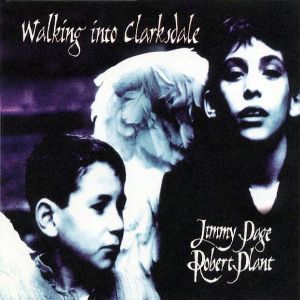
Walking into Clarksdale is the only studio album by Jimmy Page and Robert Plant, both formerly of English rock band Led Zeppelin. It was released by Atlantic Records on 20 April 1998. The album was recorded and mixed by Steve Albini at Abbey Road Studios.

Terence Edward Hall was a British musician who came to prominence as the lead singer of the 2-tone band the Specials, and later recorded with groups such as Fun Boy Three, the Colourfield, Terry, Blair & Anouchka, and Vegas.

A Certain Ratio are an English post-punk band formed in Greater Manchester in 1977 by Peter Terrell (guitar), Simon Topping, Jez Kerr, Martin Moscrop and Donald Johnson (drums), with Martha Tilson (vocals) joining soon after.

Human Nature are an Australian pop vocal group, which formed in 1989, as a quartet featuring Toby Allen, Phil Burton and brothers, Andrew and Mike Tierney. Originally they were established as a doo-wop group, called the 4 Trax, when the members were schoolmates.
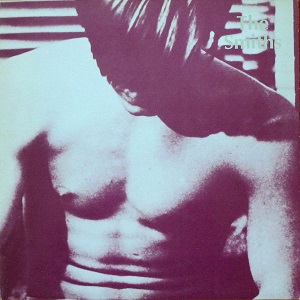
The Smiths is the debut studio album by English rock band the Smiths, released on 20 February 1984 by Rough Trade Records. After the original production by Troy Tate was felt to be inadequate, John Porter re-recorded the album in London, Manchester and Stockport during breaks in the band's UK tour during September 1983.

Surfin' U.S.A. is the second studio album by the American rock band the Beach Boys, released March 25, 1963 on Capitol Records. It reached number 2 in the US during a chart stay of 78 weeks, eventually being certified gold by the RIAA, and brought the group newfound national success. It was led by one single, its title track with the B-side "Shut Down". In the UK, the album was released in late 1965 and reached number 17.
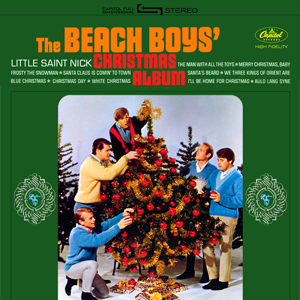
The Beach Boys' Christmas Album is the seventh studio album by the American rock band the Beach Boys, released November 9, 1964 on Capitol Records. It contains five original songs and seven standards on a Christmas theme. The album proved to be a long-running success during subsequent Christmas seasons, initially reaching No. 6 on Billboard's Christmas LP's chart in its initial release and eventually going gold. Music historian James Perone wrote that it is "regarded as one of the finest holiday albums of the rock era".

...Calling All Stations... is the fifteenth and final studio album by English rock band Genesis. It was released 1 September 1997 by Virgin Records, and is their only album featuring Scottish singer Ray Wilson as frontman following the departure of longtime drummer/singer Phil Collins in 1996, making this their only album since Trespass in which the latter did not feature in any way. The remaining members—founding keyboardist Tony Banks and guitarist/bassist Mike Rutherford—decided to continue the band and write new music for an album, during which they auditioned singers and picked Wilson.

Twelve Dreams of Dr. Sardonicus is the fourth album by the American rock band Spirit. It was produced by David Briggs, who is best known for his work with Neil Young. The original LP was released in November 1970 by Epic. The band's lowest charting album to that point, it peaked at #63 on the Billboard 200 in February 1971, spending only fourteen weeks on the chart. However, it sold well as a catalog item and became the band's only album to ultimately attain a RIAA gold certification in the U.S., achieving that status in 1976. On the Canadian RPM Magazine Top 100 charts, the album reached #49 and was in the top 100 for 10 weeks.

"I Am a Rock" is a song written by Paul Simon. It was first performed by Simon alone as the opening track on his album The Paul Simon Songbook which he originally recorded and released in August 1965, only in the United Kingdom. Paul Simon and Art Garfunkel, as the American folk rock duo Simon & Garfunkel, re-recorded it on December 14, 1965, and included as the final track on their album Sounds of Silence, which they released on January 17, 1966. It was released as a single in 1966, and subsequently included as the B-side of the 1971 A-side reissue of "The 59th Street Bridge Song ".
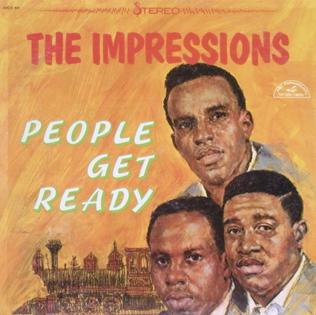
"People Get Ready" is a 1965 single by The Impressions, and the title track from the People Get Ready album. The single is the group's best-known hit, reaching number-three on the Billboard R&B chart and number 14 on the Billboard Hot 100. The gospel-influenced track was a Curtis Mayfield composition that displayed the growing sense of social and political awareness in his writing.

Bad Animals is the ninth studio album by American rock band Heart, released on May 15, 1987, by Capitol Records. The album continues the mainstream hard rock style from the band's 1985 self-titled release, all while enjoying similar success. It peaked at number two on the US Billboard 200 in August 1987 and was certified triple platinum by the Recording Industry Association of America (RIAA) on June 4, 1992. Internationally, Bad Animals charted within the top five in Canada, Finland, Norway, Sweden, and Switzerland, and the top 10 in the United Kingdom.

Hat Trick is the third studio album by the American folk rock trio America, released on Warner Bros. Records in 1973. It peaked at number 28 on the Billboard album chart; it failed to go gold, whereas the group's first two releases had platinum sales. The album produced the single, "Muskrat Love", which reached number 67 on the Billboard singles chart and number 11 on the adult contemporary chart. That song would become a much bigger hit for Captain & Tennille three years later.

Hourglass is the 13th studio album by American folk rock duo America, released by American Gramaphone in 1994. This was America's first new studio album since 1984's Perspective. Two singles were released from the album, "Young Moon" and "Hope", but did not chart in the U.S. The songs did receive more airplay in Europe. The song "Hope" became a theme song for the TJ Martell Foundation and was recorded by a group of country music stars in a fundraising effort for the Foundation. The recording of "You Can Do Magic" included here is not the hit version but a re-recording that is very similar.
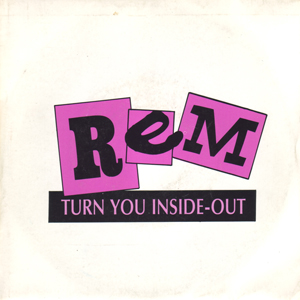
"Turn You Inside-Out" is a song by American rock band R.E.M. from their sixth studio album Green. Like all tracks on the album, it was written by group members Michael Stipe, Peter Buck, Mike Mills, and Bill Berry. The song's main guitar riff is an inversion of that used in "Finest Worksong". The recording also features percussion from former Sugar Hill Records house drummer Keith LeBlanc.

The discography of Rory Gallagher, an Irish guitarist and singer-songwriter, consists of 11 studio albums, 6 live albums, 13 compilations, and 5 singles. Gallagher was a solo artist for much of his career and collaborated with artists such as Muddy Waters and Jerry Lee Lewis. Before his career as a solo artist, Gallagher was the guitarist, vocalist, and saxophonist for the Irish rock trio Taste.
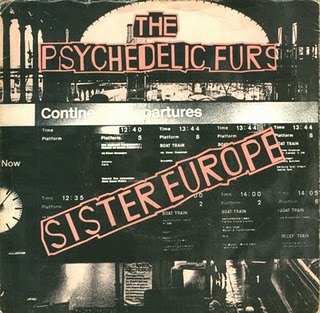
"Sister Europe" is a song by the English rock band the Psychedelic Furs, taken from the band's 1980 debut album, The Psychedelic Furs. Written by the band and produced by Steve Lillywhite, it was released in February 1980 by CBS as the album's second single.

"Joey" is the ninth track from American alternative rock band Concrete Blonde's third studio album, Bloodletting (1990). The song was released in 1990 and was written and sung by the band's frontwoman, Johnette Napolitano. The song was written in a cab on the way to a photo studio in Philadelphia; it was the last vocal recorded on the album due to Napolitano's reluctance to record the lyrics, which were hard for her to deal with.




















